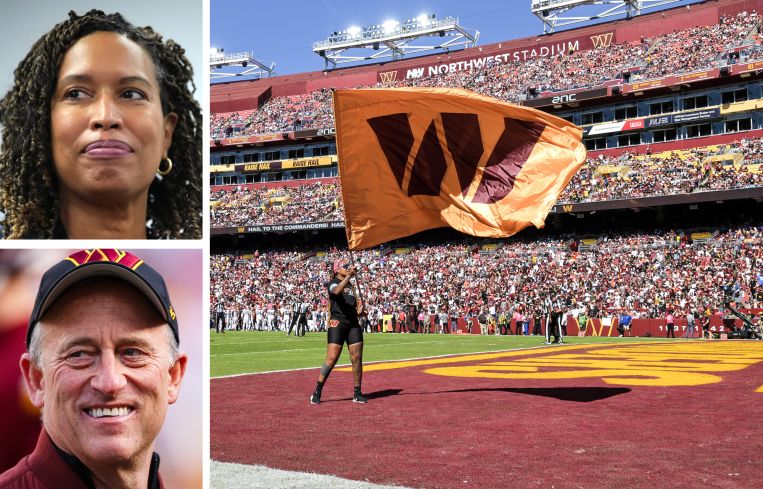Historic $3.8B RFK Stadium Deal Brings Washington Commanders Back Home
It’s the largest economic development in D.C. history, and one of the largest public investments in NFL history
By Nick Trombola September 18, 2025 3:00 pm
reprints
D.C. Mayor Muriel Bowser’s biggest victory yet is a feat that eluded four previous city administrations — bringing the Washington Commanders football team back home after nearly 30 years in exile.
The D.C. Council on Wednesday voted 11-2 to approve a $3.8 billion deal to bring the Josh Harris-owned Commanders back to the District, along with a nearly 180-acre plan to redevelop the long-vacant RFK Stadium and the surrounding area. The deal is both the largest economic development project in the history of D.C., and one of the largest public investments in NFL history, according to D.C. officials.
The Commanders’ return, and the RFK redevelopment in general, is a huge win and economic undertaking for Bowser, who has made the initiative a priority since taking office in 2015. Bowser announced the deal in April, several months after Congress shifted control of the federally owned stadium site back to the District, and about a year and half after striking a deal with Monumental Sports and Entertainment to keep the Washington Capitals and Wizards within the city.
“RFK Stadium opens in 2030, but the benefits are already here,” Bowser wrote Wednesday on X. “D.C. residents are being put to work as the city and team hire consultants, designers, and architects. With the final D.C. Council vote, we’re off to the races — or to the Super Bowl.”
Under the terms of the deal, the Commanders will invest $2.7 billion to build a new, 65,000-seat, roofed stadium — expected to open by 2030 — as well as develop two mixed-use districts surrounding the stadium. D.C. will add $1.1 billion to the plan and take the lead on developing another three commercial districts. The entire redevelopment site will include hotels, retail and entertainment spaces, along with up to 6,000 housing units.
“Today is a historic day for D.C., the Commanders organization, and our fans,” Harris said in a statement on Wednesday. “With the council’s approval, we can now move forward on the transformative RFK project that will bring lasting economic growth for our city.”
D.C.’s investment, planned to disperse over the next eight years, includes funds for land preparation and infrastructure, as well as parking garages, roadways and a study for a potential new Metro station. D.C.’s funding plan was approved earlier this summer as part of its fiscal year 2026 budget, though the cash-strapped city had to get creative by nixing the District’s $400 million plan to redevelop its jail, refinancing old debt, and leveraging a tax on businesses with more than $5 million in annual gross receipts.
But the D.C. Council needed some additional convincing.
After concerns about costs and revenue sharing were eventually assuaged, the council voted to approve the deal this week after receiving additional commitments from the Commanders, to both aim for zero waste at the stadium and to preserve heritage trees.
The deal still requires Bowser’s signature, which can safely be described as procedural at this point.
Bowser had previously managed to keep the Washington Capitals and Wizards in the District, committing to an $800 million deal last year with Monumental Sports & Entertainment to modernize and expand Capital One Arena. Once the new RFK Stadium is built and the Commanders take the field, it will be the first time in history that all five of D.C.’s major sports teams — the Commanders, Capitals, Wizards, Nationals baseball team and D.C. United soccer team — will play within the city’s borders.
Still, not everyone is happy about the Commanders’ return. Aside from Councilmembers Brianne Nadeau and Robert White, who voted against approving the deal this week due to its sheer cost, some environmental advocates also oppose the deal as a “handout” to a wealthy professional sports franchise.
“D.C. families deserve investments in clean energy, affordable housing, public transit, and clean rivers, not giveaways to billionaires that saddle D.C. residents with air, water, and climate pollution,” Mike Litt, chair of Sierra Club’s D.C. Chapter, said in a statement on Wednesday. “Instead of protections for neighbors and nearby nature, the deal brings D.C. residents more traffic, more trash, and more pollution.”
Nick Trombola can be reached at ntrombola@commercialoberver.com.



